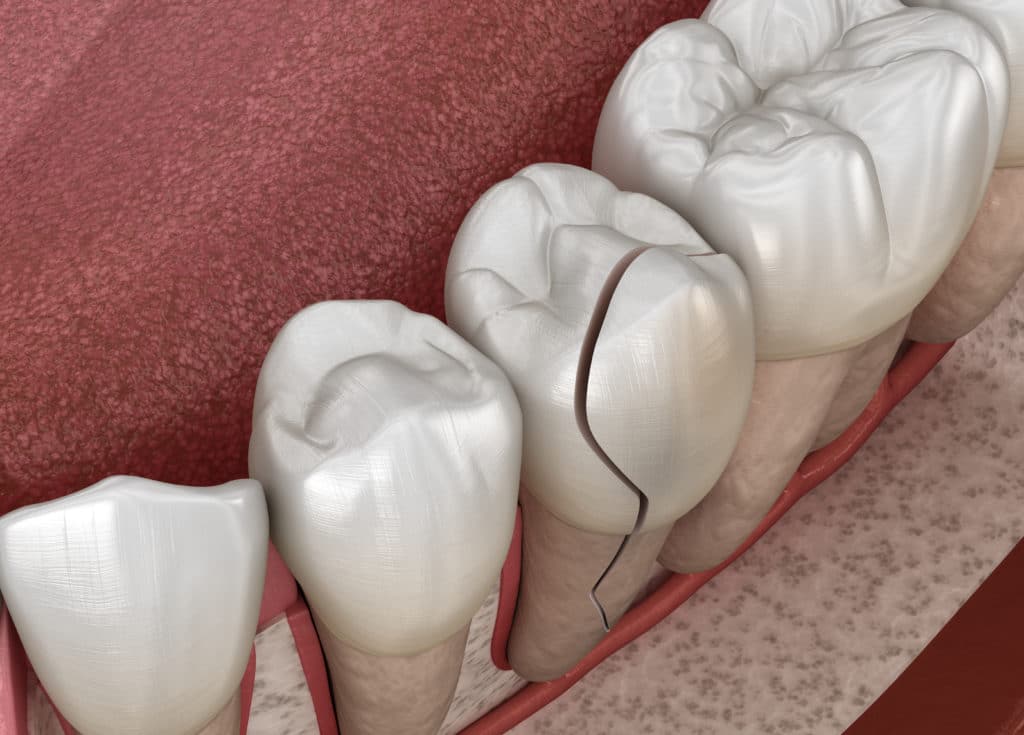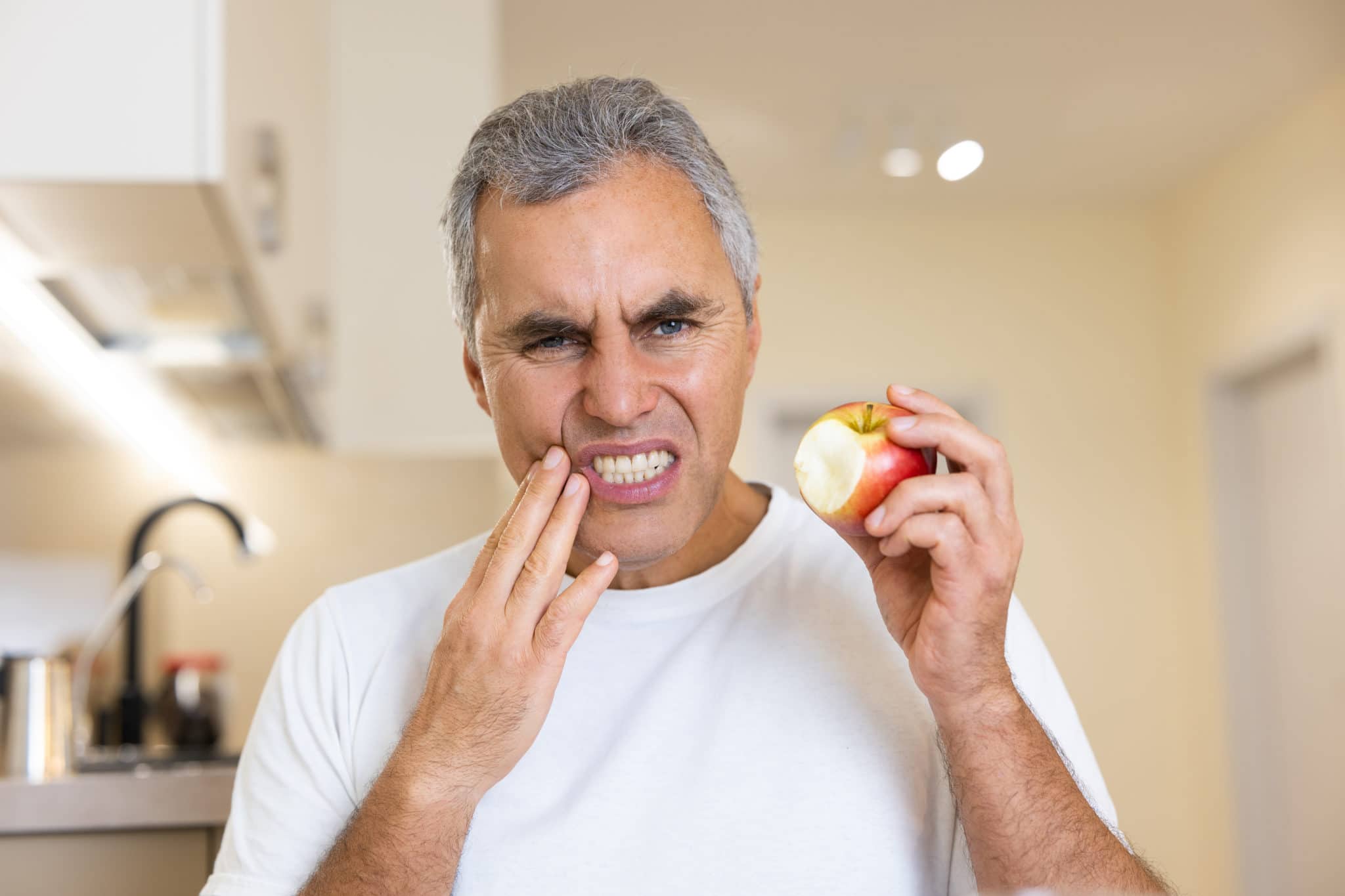My tooth hurts when I bite down. Have you ever wondered that?
If you have, you’re one of many. Pain when biting down is one of the most common types of tooth pain.
In this article, we’ll discuss why it happens, and I’ll explain the most common reasons for having pain when biting down.
Teeth are designed for chewing
The teeth are gluttons for punishment. The enamel of teeth is the most durable material in the human body. Enamel is even stronger than bones. So if teeth are so strong, why do they hurt?
Well the teeth are tasked with a pretty daunting job. They are responsible for chewing food everyday, and are subjected to all shorts of additional activity like teeth clenching, grinding, and even biting our nails. All that amounts to a near constant level of force which can reach over 200 lbs of force. That’s a lot of force on the teeth.
Although the teeth are usually pretty resilient, there are situations that can cause sensitivity. Let’s talk about the most common causes of why a tooth hurts when you bite down.
Tooth Hurts When I Bite Down— The Causes
A Tooth is Taller than the Rest
The teeth are designed to bite together with relatively equal amounts of pressure. If one tooth is taller than the other teeth next to it, it receives more pressure. More pressure on a tooth can cause pain. The tooth may feel tender to biting down and you may even get a headache on that side.
The most common causes of a tooth being too tall are after a new filling or crown is completed. Its relatively common for dental treatment to need to be fine-tuned soon after it is completed. Sometimes it is difficult to precisely achieve the ideal tooth height when the patient is numb.
A marking paper can be used to evaluate the tooth and the area of excessive pressure can easily be adjusted.
Large Cavity in a Tooth
Remember how we talked about enamel is the strongest material in the body? Well, even enamel can break down.
That breakdown is called a cavity. A cavity creates a small hole in the tooth. The tooth becomes sensitive.
A cavity makes a tooth sensitive because a break in the enamel makes sensations transmit to the nerve in the tooth more easily. In the early stages of a cavity, a tooth may be mildly sensitive to biting or temperatures of food.
If a cavity progresses long enough, it eventually causes infection and swelling of the root of the tooth. That is called a dental abscess. When this happens the pain is more distinct. You may have a throbbing sensation that lingers when biting down or when touching the gums around the tooth. An abscess is cured by a root canal.
Cracked Tooth

Sometimes an injury can happen to a tooth which causes it to develop a crack line that splits the tooth into two pieces. Signs of a cracked tooth are severe pain when biting, periodontal pocketing at the area of the crack, and sometimes the movement of the tooth when biting down.
If a tooth hurts when you bite down they rule out a fracture. A dentist can evaluate a tooth with X-rays. They easily can determine if there is a crack in the tooth and the severity of the fracture.
If only the top portion of the tooth is fractured, it usually may be restored with a root canal and a dental crown. However, if the tooth is severely fractured fully in half, there is a possibility it may not be savable.
Sinus Pressure or Congestion
It can be easy to forget that the top of the mouth and the bottom of the nose are immediately adjacent to each other. The roots of your top teeth actually extend partially into your sinus in certain areas. So if the teeth and the sinus are in such close proximity, it should be easy to understand that pressure in the sinus can cause pressure on the teeth.
When the sinuses are congested or inflamed, it can create temporary sensitivity on the teeth when biting down. Usually, the top teeth are potentially affected by the sinus—from the last tooth to the fourth tooth from the back.
Gum Disease
The teeth are like a house and the gums are like a foundation. Just like a house cannot last on a shaky foundation, the same happens with the teeth. If the gums are inflamed or the teeth are loose due to gum disease, then they can easily be overwhelmed by the pressure of chewing.
Therefore, gum disease can also cause pain when biting down in some cases.
Tooth Hurts When I Bite Down— Wrapping Up
Sometimes a tooth sensitivity may be a flash in the pan. If you are having mild sensitivity, monitor it for a day or two. But if your pain is worsening or not improving, have a dentist take a look at it. Often a simple fix can make the tooth feel much better. And if there is something more serious brewing, it’s much more predictable to treat earlier in the process.


